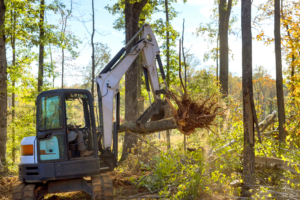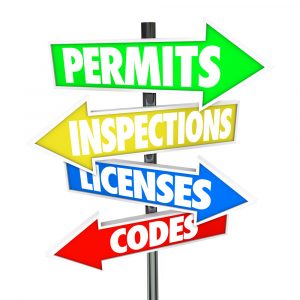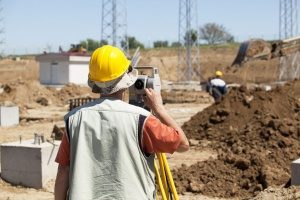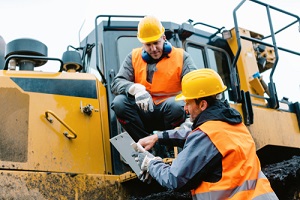Complete Guide to Land Clearing Services Near You: How to Find the Best One for Your Project
 Are you planning a construction project and need to clear the land before you can start building? Finding the best land clearing services near you can feel overwhelming, but don’t worry! This complete guide will walk you through the steps to find the perfect land clearing service for your project.
Are you planning a construction project and need to clear the land before you can start building? Finding the best land clearing services near you can feel overwhelming, but don’t worry! This complete guide will walk you through the steps to find the perfect land clearing service for your project.
Land clearing services involve removing trees, vegetation, and other obstacles from a piece of land to make it ready for development. It’s important to hire professionals with the right expertise and equipment to handle the job safely and efficiently.
Whether you need land clearing for a residential or commercial project, this guide will help you explore the options available to you. We’ll look at key factors to consider when choosing a land clearing service, such as their experience, equipment, insurance coverage, and customer reviews.
By the end of this guide, you’ll have the knowledge and confidence to find the best land clearing services near you. This will ensure your project goes smoothly and successfully. So, let’s dive in and make the process of land clearing as easy and stress-free as possible!
Choosing the Right Tools for Your DIY Projects
When starting any DIY project, having the right tools is essential to ensure success and avoid frustration. A well-rounded toolset not only saves time but also makes your work more precise and enjoyable. Begin by investing in high-quality basics like a hammer, screwdrivers, and a tape measure—these are the cornerstones of any project. For more specialized tasks, consider adding power tools like a cordless drill or a jigsaw. These tools can handle tougher jobs and expand the range of projects you can tackle. Whether you’re hanging shelves, assembling furniture, or doing home repairs, the right tools can make all the difference. Remember, it’s better to invest in durable, reliable tools that will last through many projects than to settle for cheaper options that might break down quickly. By building a versatile toolset tailored to your needs, you’ll be prepared for whatever DIY challenge comes your way.
Why Land Clearing is Important for Construction Projects
 Land clearing is a crucial first step in any construction project, whether it’s for a new home, a commercial building, or infrastructure. Before construction can begin, the land must be cleared of obstacles, vegetation, or debris. This step is essential for the success and safety of the entire project.
Land clearing is a crucial first step in any construction project, whether it’s for a new home, a commercial building, or infrastructure. Before construction can begin, the land must be cleared of obstacles, vegetation, or debris. This step is essential for the success and safety of the entire project.
One main reason for land clearing is to create a clean, level surface suitable for construction. Uneven terrain, large rocks, or dense vegetation can make it difficult to lay foundations, install utilities, or build structures. Clearing these obstacles transforms the land into a blank canvas, allowing construction crews to work more efficiently.
Land clearing also improves site accessibility. Heavy construction equipment needs clear pathways to move materials. Removing trees, stumps, and debris ensures that the site is accessible, preventing machinery from getting stuck or causing damage.
Additionally, land clearing ensures the safety of construction workers and the environment. Overgrown vegetation, unstable slopes, or hazardous materials can pose significant risks. Clearing the land eliminates these hazards, creating a safer work environment and reducing the chances of accidents.
Different Methods of Land Clearing
There are several methods of land clearing, each with its pros and cons. The best method depends on factors like the site’s size, terrain, vegetation type, and the project’s requirements.
Mechanical Clearing is a common method involving heavy machinery like bulldozers, excavators, and skid-steer loaders. These machines efficiently remove trees, stumps, and large obstacles, making them ideal for clearing large areas. Mechanical clearing is often the most cost-effective and time-efficient option, especially for projects requiring significant vegetation or debris removal.
Manual Clearing uses hand tools like chainsaws, axes, and machetes. While more labor-intensive, it’s useful for clearing smaller or densely vegetated areas or for selectively removing specific trees or plants. Manual clearing can also be more environmentally friendly, as it minimizes impact on the surrounding ecosystem.
Chemical Clearing involves applying herbicides or vegetation-killing agents. This method is effective for clearing large areas of invasive plant species or preparing the land for future development. However, chemical use may have environmental implications and should be carefully considered and regulated.
Regardless of the method, it’s important to carry out the land clearing process safely, efficiently, and responsibly. This may include obtaining permits, following local regulations, and using best practices for waste disposal and site restoration.
Factors to Consider When Choosing a Land Clearing Service
 When selecting a land clearing service, consider several key factors to ensure you choose the right provider for your needs:
When selecting a land clearing service, consider several key factors to ensure you choose the right provider for your needs:
- Experience and Expertise: Look for a service with a proven track record of completing projects like yours. A team with the right skills and knowledge is crucial.
- Equipment and Capabilities: Make sure the service has the necessary machinery and tools to handle your project, whether it’s large-scale mechanical clearing or specialized manual work.
- Safety and Compliance: Land clearing can be hazardous, so choose a service that prioritizes safety and follows all relevant regulations. Look for a strong safety record and proper insurance coverage.
- Environmental Considerations: If your project involves sensitive areas, choose a service committed to environmental responsibility. They should minimize waste, protect wildlife, and restore the site after work is completed.
- Customer Service and Communication: A provider that is responsive and transparent can make your project run smoothly. Good communication helps prevent misunderstandings and delays.
By evaluating these factors, you can find a land clearing service well-equipped to meet your project’s unique needs.
Researching and Finding Land Clearing Services Near You
Once you know what factors are important for your project, start researching the best land clearing services in your area. Use a combination of online searches, industry directories, and personal referrals.
Start with an online search for “land clearing services near me.” Look for companies with strong online presences, including informative websites that showcase their services, equipment, and past projects. Pay attention to their website quality, the information provided, and customer reviews or testimonials.
You can also consult industry directories or professional organizations specializing in land clearing and construction services. These resources can help you find reputable providers in your area.
Personal referrals from other construction professionals, like general contractors, architects, or developers, are also valuable. Reach out to your network and ask for recommendations.
When researching potential services, gather as much information as possible about their capabilities, experience, and approach. Review their past projects, check their licensing and insurance, and even visit their facilities if possible.
By thoroughly researching and evaluating local land clearing services, you can find a provider that meets your project’s specific needs.
Questions to Ask When Interviewing Land Clearing Companies
 Once you’ve narrowed down your list of potential services, schedule interviews with each one. Ask key questions to assess their suitability for your project:
Once you’ve narrowed down your list of potential services, schedule interviews with each one. Ask key questions to assess their suitability for your project:
- What is your experience in land clearing, and what types of projects have you worked on? Look for a provider with experience in projects similar to yours.
- What equipment will you use for our project? Make sure they have the right tools and capabilities.
- How do you ensure safety during the land clearing process? Ask about their safety protocols, training, and insurance coverage.
- What is your approach to environmental responsibility? Inquire about their practices for minimizing waste and protecting the environment.
- Can you provide a detailed timeline for the land clearing process? Understand their project management approach.
- Do you have references or testimonials from past clients? Speak with other customers to gauge the service’s quality of work and communication.
- What is your process for obtaining permits and ensuring compliance with local regulations? Make sure they can handle the necessary paperwork.
By asking these questions, you can gain a deeper understanding of the service’s capabilities and commitment to delivering a successful project.
Evaluating the Reputation and Track Record of Land Clearing Services
In addition to interviews, research and evaluate the reputation and track record of any service you’re considering. This will help you make an informed decision.
Check online reviews and testimonials on platforms like Google and Yelp. Look for feedback from past clients and pay attention to overall ratings, the nature of the feedback, and any recurring themes.
Also, check the service’s standing with professional organizations or industry associations. Memberships or certifications can demonstrate a commitment to quality, safety, and ethical practices.
Ask the service to provide a portfolio or case studies showcasing their work. Look for evidence of their ability to handle projects similar to yours.
If possible, speak with past clients directly to get a better understanding of their experience. This can provide valuable insights into the provider’s communication, problem-solving abilities, and customer satisfaction.
Finally, conduct a background check or research any legal or regulatory issues associated with the service. This can help you identify any potential concerns that could impact your project.
By thoroughly evaluating the reputation and track record of potential services, you can have greater confidence in your selection.
Obtaining Quotes and Comparing Prices
 After narrowing down your list of potential providers, obtain quotes and compare prices. This process will help you identify the most cost-effective option that aligns with your project’s budget.
After narrowing down your list of potential providers, obtain quotes and compare prices. This process will help you identify the most cost-effective option that aligns with your project’s budget.
When requesting quotes, provide a detailed scope of work, including the site’s size, specific tasks, and any timeline considerations. This ensures accurate and comprehensive quotes.
Review the itemized breakdown of costs, including labor rates, equipment fees, and additional charges for permits or site restoration. This detail helps you understand the pricing structure and identify areas for negotiation.
Remember, the cheapest quote isn’t always the best option. Consider the provider’s experience, expertise, and reputation, as well as the quality of their work. A slightly higher price may be justified if it means working with a more reliable and capable service.
Be cautious of quotes that are significantly lower than the industry average, as this could indicate hidden costs or substandard work. If a quote seems too good to be true, investigate further.
By carefully comparing quotes and considering all relevant factors, you can make an informed decision that balances cost and quality.
Reviewing Contracts and Ensuring Legal Compliance
 Once you’ve selected a land clearing service, review the contract and ensure all legal requirements are met. This step protects your interests and ensures the work complies with regulations.
Once you’ve selected a land clearing service, review the contract and ensure all legal requirements are met. This step protects your interests and ensures the work complies with regulations.
Pay close attention to these key elements:
- Scope of Work: Ensure the contract outlines the specific tasks and deliverables, including timelines.
- Pricing and Payment Terms: Review the pricing structure, payment schedule, and any additional charges.
- Insurance and Liability: Confirm that the service has appropriate insurance coverage, including general liability and workers’ compensation.
- Environmental Compliance: Review provisions related to environmental responsibility, such as waste disposal and site restoration.
- Permits and Regulatory Compliance: Ensure the service is responsible for obtaining necessary permits and following regulations.
- Warranties and Guarantees: Look for warranties or guarantees related to the quality of work and equipment performance.
If you have concerns about the contract, seek advice from a legal professional. It’s also essential to verify the service is properly licensed and insured to operate in your area.
By reviewing the contract and ensuring legal compliance, you can mitigate risks and set the stage for a successful project.
The Environmental Impact of Land Clearing
 Land clearing can have significant environmental effects, especially if not done responsibly. The removal of trees and vegetation disrupts local ecosystems and can lead to soil erosion, loss of habitat, and water runoff issues. To minimize these impacts, it’s crucial to work with a land clearing service that prioritizes sustainability. This might include methods like selective clearing, where only certain areas or species are removed, or using techniques that minimize soil disturbance. By choosing environmentally responsible practices, you can help protect the surrounding environment while still preparing your land for development.
Land clearing can have significant environmental effects, especially if not done responsibly. The removal of trees and vegetation disrupts local ecosystems and can lead to soil erosion, loss of habitat, and water runoff issues. To minimize these impacts, it’s crucial to work with a land clearing service that prioritizes sustainability. This might include methods like selective clearing, where only certain areas or species are removed, or using techniques that minimize soil disturbance. By choosing environmentally responsible practices, you can help protect the surrounding environment while still preparing your land for development.
Permits and Regulations: What You Need to Know
Before starting a land clearing project, it’s important to understand the permits and regulations that apply to your area. Local, state, and federal laws often govern land clearing to protect natural resources and ensure safety. You may need permits for tree removal, soil disturbance, or working near water bodies. Failing to obtain the necessary permits can result in fines, project delays, or even legal action. Make sure your land clearing service is familiar with the relevant regulations and can handle the permitting process. This ensures that your project stays compliant and on schedule.
Common Challenges in Land Clearing and How to Overcome Them
Land clearing can present several challenges, from dealing with unexpected obstacles like large rocks or buried debris to navigating tricky terrain. Weather conditions, such as heavy rain or snow, can also delay progress and complicate the work. To overcome these challenges, it’s essential to plan ahead and work with experienced professionals. A reputable land clearing service will have the right equipment and know-how to tackle these obstacles efficiently. Additionally, they can adjust their approach based on the specific conditions of your site, ensuring that the project proceeds smoothly.
Sustainable Land Clearing Practices
 Sustainable land clearing focuses on methods that reduce environmental impact while still achieving the desired results. Techniques like selective clearing, where only necessary vegetation is removed, help preserve the natural landscape. Using low-impact machinery or manual methods can also protect soil structure and prevent erosion. Another sustainable practice is mulching, which recycles cleared vegetation into mulch for the site, reducing waste and enriching the soil. By opting for sustainable practices, you can clear your land in a way that supports long-term environmental health.
Sustainable land clearing focuses on methods that reduce environmental impact while still achieving the desired results. Techniques like selective clearing, where only necessary vegetation is removed, help preserve the natural landscape. Using low-impact machinery or manual methods can also protect soil structure and prevent erosion. Another sustainable practice is mulching, which recycles cleared vegetation into mulch for the site, reducing waste and enriching the soil. By opting for sustainable practices, you can clear your land in a way that supports long-term environmental health.
How to Prepare Your Land for Clearing
Proper preparation can make your land clearing project more efficient and cost-effective. Start by surveying the land to identify obstacles like large trees, rocks, or structures that need to be removed. Mark boundaries and areas that require special attention, such as protected habitats or water bodies. Clearing the area of any debris or movable items will also help the process go more smoothly. Finally, communicate with your land clearing service about any specific concerns or requirements you have. By preparing the site in advance, you can help ensure that the clearing process is quick, safe, and successful.
Case Studies: Successful Land Clearing Projects
 Real-life examples of successful land clearing projects can provide valuable insights into what works and what doesn’t. For instance, one project might highlight how a team overcame challenging terrain by using specialized equipment, while another might showcase how sustainable practices were employed to protect a sensitive ecosystem. By reviewing case studies, you can gain a better understanding of different approaches to land clearing and learn from the successes and challenges of others. This knowledge can help you make informed decisions and set realistic expectations for your own project.
Real-life examples of successful land clearing projects can provide valuable insights into what works and what doesn’t. For instance, one project might highlight how a team overcame challenging terrain by using specialized equipment, while another might showcase how sustainable practices were employed to protect a sensitive ecosystem. By reviewing case studies, you can gain a better understanding of different approaches to land clearing and learn from the successes and challenges of others. This knowledge can help you make informed decisions and set realistic expectations for your own project.
How Weather and Seasonal Factors Affect Land Clearing
Weather and seasonal factors can greatly impact land clearing projects. For example, heavy rainfall can cause soil to become too soft for heavy machinery, leading to delays or even equipment getting stuck. On the other hand, extremely dry conditions can increase the risk of fire, making clearing more dangerous. Winter weather can also present challenges, such as frozen ground or snow-covered vegetation. To mitigate these risks, it’s important to plan your land clearing during optimal weather conditions and to work with a service that can adapt to changing circumstances. This planning ensures your project stays on track, no matter the season.
What to Expect During the Land Clearing Process
 Understanding what happens during the land clearing process can help you prepare and feel more confident. The process typically begins with a site survey to assess the land and plan the clearing strategy. Next, large obstacles like trees and rocks are removed, followed by clearing smaller vegetation and debris. Depending on the method, the cleared materials may be mulched, hauled away, or left on-site for other uses. Throughout the process, safety measures are strictly followed to protect workers and the environment. Knowing these steps can help you anticipate what’s coming and ensure everything goes according to plan.
Understanding what happens during the land clearing process can help you prepare and feel more confident. The process typically begins with a site survey to assess the land and plan the clearing strategy. Next, large obstacles like trees and rocks are removed, followed by clearing smaller vegetation and debris. Depending on the method, the cleared materials may be mulched, hauled away, or left on-site for other uses. Throughout the process, safety measures are strictly followed to protect workers and the environment. Knowing these steps can help you anticipate what’s coming and ensure everything goes according to plan.
Long-Term Site Maintenance After Land Clearing
After land clearing, maintaining the cleared site is crucial for long-term success. Regular maintenance helps prevent the regrowth of unwanted vegetation and keeps the area ready for development. This might include periodic mowing, applying herbicides, or planting ground cover to prevent erosion. It’s also important to monitor the site for any signs of soil instability or drainage issues, which can arise after clearing. By staying proactive with site maintenance, you can ensure that the cleared land remains in good condition and is ready for future use.
Conclusion and Final Tips for Hiring the Best Land Clearing Service
 In conclusion, finding the best land clearing service for your construction project requires careful research and evaluation. By considering the factors in this guide, you can select a provider that will deliver high-quality results while ensuring safety and minimizing environmental impact.
In conclusion, finding the best land clearing service for your construction project requires careful research and evaluation. By considering the factors in this guide, you can select a provider that will deliver high-quality results while ensuring safety and minimizing environmental impact.
Keep these final tips in mind:
- Start Early: Begin your search early to allow ample time for thorough evaluation.
- Prioritize Communication: Choose a service that is responsive and proactive in communication.
- Consider Long-Term Implications: Don’t sacrifice quality or safety for a lower price. A reputable service can save you time and money in the long run.
- Stay Involved: Monitor the project’s progress and address concerns promptly.
- Build Relationships: If satisfied, consider developing an ongoing relationship for future projects.
By following these tips and the guidance in this comprehensive guide, you’ll be well-prepared to find the best land clearing service for your project. This will ensure a smooth, successful, and environmentally responsible outcome.
Get Started with Professional Land Clearing Today
 Are you ready to take the next step in transforming your property? Whether you’re planning a construction project or simply need to clear your land, our expert team is here to help. We proudly serve serious landowners in Maryland, Virginia, and the Washington DC metro area. Don’t wait—ensure your project starts off on the right foot with our professional land clearing services. Fill out our “Request A Quote” form today, and let us provide you with a personalized, no-obligation estimate. We’re committed to delivering top-notch service and making your land clearing process smooth and stress-free. Reach out now and let’s get your project underway!
Are you ready to take the next step in transforming your property? Whether you’re planning a construction project or simply need to clear your land, our expert team is here to help. We proudly serve serious landowners in Maryland, Virginia, and the Washington DC metro area. Don’t wait—ensure your project starts off on the right foot with our professional land clearing services. Fill out our “Request A Quote” form today, and let us provide you with a personalized, no-obligation estimate. We’re committed to delivering top-notch service and making your land clearing process smooth and stress-free. Reach out now and let’s get your project underway!
Summary

Dirt Connections was started with one goal in mind: providing quality residential and commercial construction services to clients on time and on budget. Reach out for more information on how we can support your next project.
For your convenience our estimates are free and by appointment. Call 703-940-9949 for a free estimate today!









































